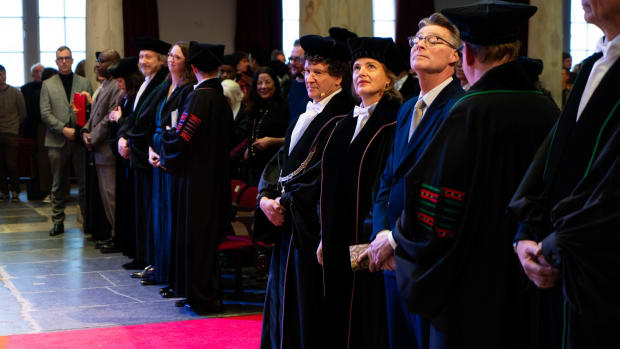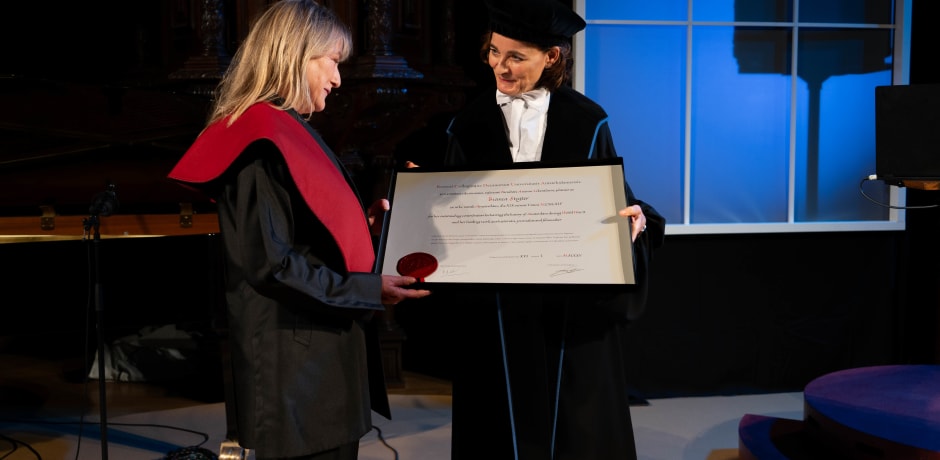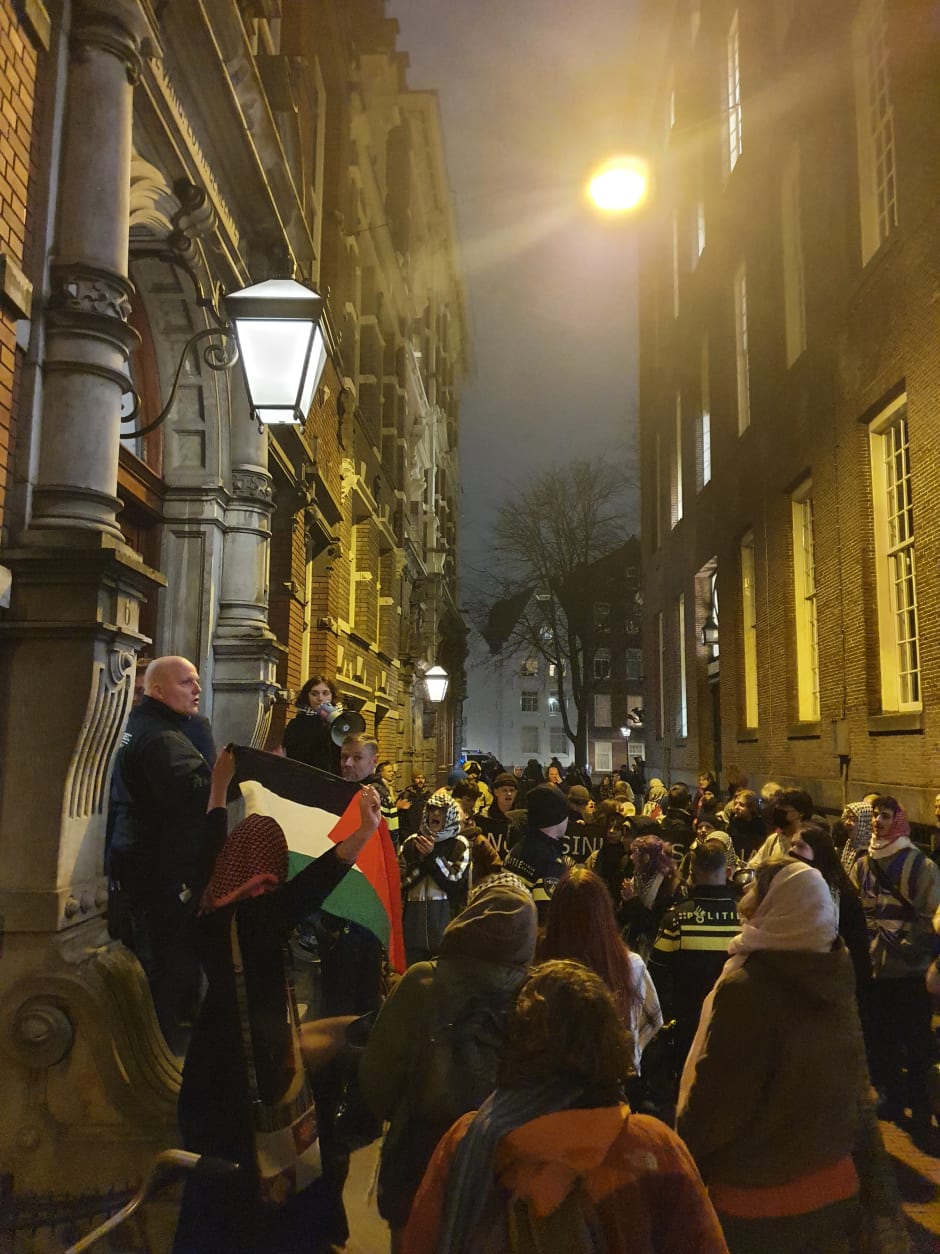
Rector Verbeek pleads for connection at dies natalis ending with Palestine protest
After a year in which togetherness at the university was sometimes hard to find, rector magnificus Peter-Paul Verbeek pleads for “sense of community” during the 393rd dies natalis of the UvA. Some 40 pro-Palestine demonstrators hold a noise demonstration on the Spui.
With an inspired speech, rector magnificus Peter-Paul Verbeek opened the 393rd dies natalis of the University of Amsterdam on Thursday afternoon. Verbeek spoke of the university as a place “where you can always start anew, think differently and go against the established order”. But also as a place of “sense of community”, one where you can reach knowledge and insights together.
Not uncommonly, that togetherness has been lacking at the university over the past year. The discussion on the ethical framework cooperation with third parties was partly supposed to put an end to that, but does not seem to have done so as yet. Margriet Schavemaker, artisitic director of the Amsterdam Museum, emphasised it a little later in her graduation speech: “The wounds of the pro-Palestine protests are far from healed.”
That Verbeek stated that “in our conversations about this ethical framework, it has also proved important to keep a focus on mutual connection and to be guided by the “sensus communis”, should come as no surprise”. Another point of focus, according to Verbeek: artificial intelligence. Or as the rector himself put it: “AI is a disruptive technology, disrupting the role of the university in many ways. It has a major impact on what students have to learn, how they connect with each other and society, and how they develop as persons.”
But it also offers opportunities, he nuanced: in doing research, formulating questions and making meaning out of data. So he proudly announced that the UvA has developed its own system to make use of ChatGPT, without linking to the system of OpenAI (the developer of ChatGPT). This improves user privacy and the security of research data, Verbeek said.
Medal and honorary doctorates
Shortly afterwards, his former colleague, former college president Geert ten Dam, was presented with the Frans Banninck Cocqpenning by deputy mayor of Amsterdam, Hester van Buren. This is an award from the city of Amsterdam for people who have made meritorious efforts in cultural, economic or social fields. Van Buren praised Ten Dam for her “unique combination of optimism, intellectual curiosity, generosity, political sense and ingenuity” and her important role in setting up all kinds of initiatives. From the Inequality Knowledge Centre to the emergency fund for students from Ukraine, Russia and Belarus and her contribution to stimulating research on Artificial Intelligence.

Traditionally, honorary doctorates are also handed out during the dies. This year, that honour fell to three people: Belgian professor of biomechanics Liesbet Geris, Dutch historian, writer and filmmaker Bianca Stigter and her husband, British director, filmmaker and screenwriter Steve McQueen.
Geris was honoured for her research into a Virtual Human Twin. This is a digital representation of a person, which allows their physical and biological processes to be accurately mimicked. The aim is to improve healthcare by simulating personalised treatments before they are applied to a real patient. Moved and grateful, Geris accepted her new doctoral degree. She was happy to be part of ‘the UvA family’ from now on.
For writer Bianca Stigter, the UvA is more familiar territory; in the 1980s she studied history at the Amsterdam university. She then became the writer of several books and columns, and produced (documentary) films such as the thorough and meticulous Three Minutes: A Lengthening about the Jewish population in the Polish town of Nasielsk anno 1938. World War II is a recurring theme in her oeuvre, including the monumental Atlas of the Occupied City as one of her major achievements.
WWII also proved an inspiration for her spouse, Steve McQueen. With The Occupied City and Blitz, he produced two lauded films about the war, having previously produced, among others, the multiple Oscar-winning 12 Years a Slave.

Palestine protest
Towards the end of the dies, just as Steve McQueen began the final speech of the afternoon, pro-Palestinian slogans - “Free, Free Palestine” - echoed from outside into the auditorium. These came from 40, at most 50 activists who had gathered on the Spui to demonstrate against the UvA’s stance on the Israel-Palestine conflict. Apart from chanting slogans, they were hitting cooking pans with spoons and banging on the side wall of the Old Lutheran Church. It was easy to hear inside, albeit only as background noise.
It became much louder at the back entrance on Handboogstraat, where all those present had to leave the auditorium to go home or to the adjoining Maagdenhuis, where the subsequent drinks were to take place. Everyone who came out was immediately face to face with the protesters, who were scanning pro-Palestinian slogans in their direction. On both sides, police kept an eye on things. For those present, it was a remarkable, but perhaps unsurprising and illustrative conclusion to UvA’s 393rd anniversary given the past year.


